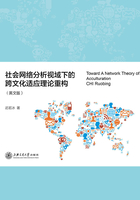
Foreword
by dharma prakash zarmA bhAwuk
Herbert Simon, Nobel Laureate for Economics(Simon, 1978)criticized how most of the research in economics utilized models that did not deal with the real world of organizations where bounded rationality and satisfycing rather than rationality guided decisions.Others have similarly criticized the laboratory method in experimental psychology and how it does not apply to the real world.Ruobing needs to be congratulated for studying people in an organization dealing with the real world in cultivating their social network.Therefore, her findings are close to the real world and ready to be applied for improving social network to improve intercultural relations.
We implicitly utilize satisfycing in cultivating our social networks, and we can all attest to the fact that some of our relationships have fallen by the wayside because we simply could not find the time and energy to nurture them.Social network research can be a domain to examine how we use satisfycing rather than rational cost-benefit analysis in our decision to nurture some relationships and not others.A setting like the East-West Center offers tremendous opportunity to study international social network, especially because participants arrive there for two to four years, and then scatter all over the Asia and the Pacific.
The value of social network for innovation has been emphasized.Dr.Waguih Ishak, Division Vice President and Chief Technologist at Corning Research &Development Corporation, identified six factors that he thought were less intuitive in creating an innovation culture in an organization.One of them is cultivating external relationships or developing a network outside the organization.Ishak(2017)presented an example of how other companies in the Silicon Valley profited from the discovery of bending optical fibers in a very tight radius that Corning shared.Social networks are critical for innovation, and Dr.Chi Ruobing presents an in depth study of how such a network is developed internationally at the EastWest Center.
I am an alum of the East West Center(1987—1989), and can speak for the value of developing such a social network from my personal experience.My academic career would not have been what it is but for the association with the Center and the social network I developed there.My work started in cross-cultural psychology and shifted to indigenous psychology and management over the years, and the nurturing social network had a critical role to play in it.So, though I am not in the sample in Ruobing's study, I could have been if she had conducted it two decades earlier, and her findings would have been the same.It is this universality across time of the findings of this research that makes it worth reading for everybody interested in international relations and its impact on our global social network.
The network of various groups of individuals in her research shows that often host nationals interact instrumentally with people of a particular country or region because of their interest in the language and culture of that area.However, they are also able to glue together people of many cultures at times because of members varied interests, showing the power of weak links in transactions across cultural groups.This also allows international visitors to expand their network beyond their own national group.What is interesting is that even those who choose to interact primarily with their own country nationals, and remain on the periphery of the groups, are roped into some exchange with people of other cultures and are functionally effective in their intercultural interactions in the host culture.These findings challenge the major theories of acculturation where marginalization is seen necessarily as a case of intercultural failure needing serious intervention and integration is viewed as the optimal strategy for intercultural effectiveness.People choosing to be on the periphery may be functionally integrated sufficiently and the most active hosts and internationals may also be only instrumentally bi-cultural rather than generally multicultural.
The role of the people in the networks of her participants who connect different cultural groups are particularly important as they build unique channels of communications that allows people from different backgrounds and cultures to harmonize their transactions.I called such people cultural champions(Bhawuk, 2001)who help develop superordinate goals for the effective development and implementation of various economic and social development projects that are funded by one country into another country.Dr.Chi Ruobing's study is likely to be valuable for people working in international development proj ects.
dharma prakAza zarmA BhAwuk
Professor of Management and
Culture and Community Psychology
University of Hawaii at Manoa, U.S.A.
References
Bhawuk, D.P.S.(2001).Looking for the Silver Lining:Integrative Potentials in International Proj ect Negotiation.Psychology and Developing Societies, 13(2), 243-262.
Ishak, W.(2017).Creating an innovation culture, McKinsey Quarterly, September, 1-5.
Simon, H.A.(1978).Rational Decision-Making in Business Organizations.Nobel Memorial Lecture, 8 December, 1978.
https://www.nobelprize.org/nobel_prizes/economic-sciences/laureates/1978/simon-lecture.pdf